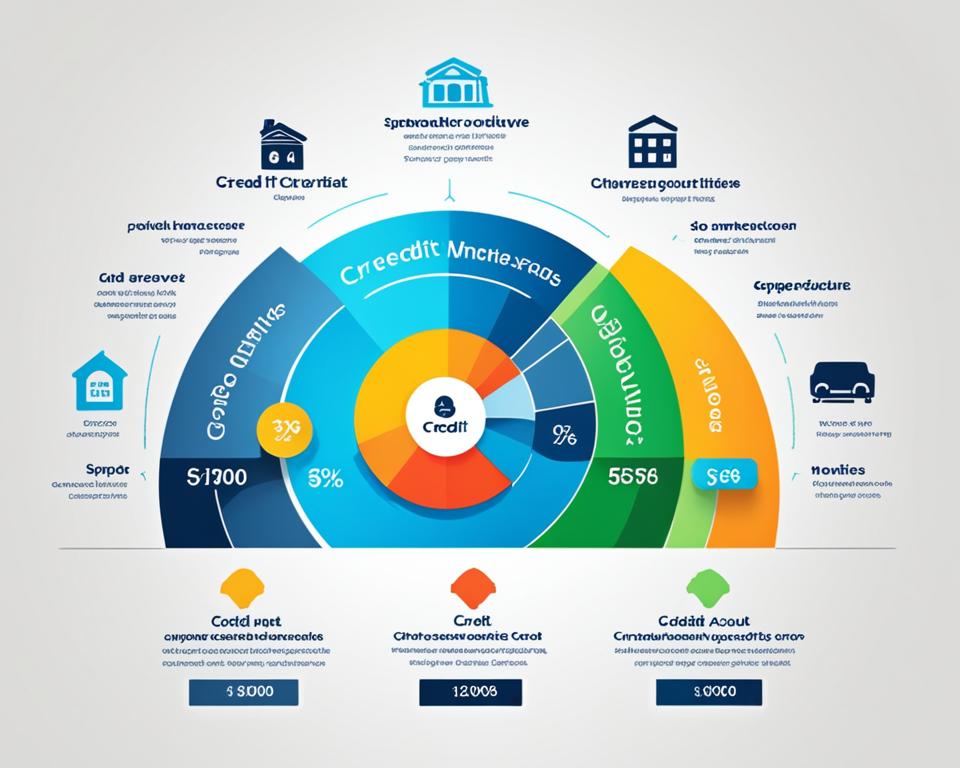Monitoring your credit regularly is an essential credit repair tip that can significantly impact your financial health. By keeping a watchful eye on your credit, you can identify any potential issues and take steps to resolve them, ultimately improving your overall credit score.
Whether you’re working to repair a damaged credit history or maintain a healthy credit profile, monitoring your credit is a proactive approach that allows you to stay informed and in control of your financial well-being.
With credit monitoring, you can track any changes or updates to your credit report and address them promptly. It allows you to detect and prevent identity theft, potential errors, or fraudulent activities that may negatively impact your creditworthiness.
To help you make the most out of credit monitoring, here are some essential tips:
Key Takeaways:
- Regularly monitoring your credit is crucial for credit repair.
- By monitoring your credit, you can identify and address issues promptly.
- Credit monitoring helps in improving your overall financial well-being.
- Stay informed about any changes or updates to your credit report.
- Protect yourself from identity theft or fraudulent activities.
By implementing these credit monitoring tips, you can take proactive steps towards achieving long-term credit success and financial stability.
Why is monitoring your credit essential?
Monitoring your credit is of utmost importance when it comes to maintaining a strong credit score and overall financial health. By regularly monitoring your credit, you can stay informed about any changes, identify potential issues, and take the necessary steps to address them.
Credit monitoring helps you stay in control of your financial well-being. It allows you to keep a close eye on your credit activity and ensures that you are aware of any suspicious or unauthorized transactions. By detecting fraudulent activity early on, you can minimize the potential impact on your credit score and financial stability.
Monitoring your credit also provides valuable insights into your financial habits. It allows you to track your spending patterns, payment history, and overall credit utilization. By understanding how your financial behavior impacts your credit score, you can make informed decisions and implement positive changes to improve your creditworthiness.
“Credit monitoring is like having a financial compass guiding you towards a healthier credit profile.”
When it comes to effectively monitoring your credit, it’s essential to know the best ways to do so. Here are some of the most recommended methods:
- Regularly review your credit reports: Obtain copies of your credit reports from the three major credit bureaus – Equifax, Experian, and TransUnion. Check for any inaccuracies, errors, or suspicious activities. This will help you identify any potential issues that may be affecting your credit score.
- Set up credit alerts and notifications: Take advantage of credit monitoring services that offer alerts and notifications for any changes in your credit reports or scores. These alerts can help you detect unusual activity or potential identity theft.
- Utilize credit monitoring apps: There are several mobile applications available that provide real-time access to your credit reports and scores. These apps often offer additional features such as credit score simulators and educational resources to help you better understand your credit.
By implementing these best practices and staying vigilant about monitoring your credit, you can proactively manage your credit health and ensure a strong financial foundation.
| Benefits of Credit Monitoring | Best Practices for Credit Monitoring |
|---|---|
| 1. Early detection of fraudulent activity | 1. Regularly review credit reports |
| 2. Protection against identity theft | 2. Set up credit alerts and notifications |
| 3. Insights into financial habits and behaviors | 3. Utilize credit monitoring apps |
| 4. Improved credit score management | |
| 5. Peace of mind and financial control |
How to monitor your credit
Monitoring your credit is an essential step in maintaining a healthy financial profile. By keeping a close eye on your credit activity, you can identify potential issues and take necessary action promptly. In this section, we will guide you through practical steps on how to monitor your credit effectively. Let’s dive in!
Credit Check Tips:
- Regularly Review Your Credit Reports: Obtain your credit reports from the major credit reporting agencies – Equifax, Experian, and TransUnion. Carefully examine the information to ensure its accuracy. Look out for any discrepancies, such as incorrect personal details, unauthorized accounts, or suspicious activities.
- Set Up Credit Alerts: Take advantage of credit monitoring services or alerts provided by credit card issuers and financial institutions. These alerts can notify you of any significant changes or potential fraud attempts on your accounts, helping you stay vigilant.
- Monitor Your Credit Score: Keep track of your credit score to gauge your financial health. There are numerous free credit score monitoring services available that provide regular updates. Alternatively, consider utilizing paid services that offer more comprehensive credit monitoring features.
The Importance of Credit Report Monitoring:
Your credit report reflects your financial history and plays a crucial role in determining your creditworthiness. Regularly monitoring your credit report allows you to:
- Identify Errors: Detect any errors or inaccuracies in your credit report and address them promptly. Incorrect information can negatively impact your credit score and financial opportunities.
- Prevent Fraudulent Activities: Spot any signs of identity theft or fraudulent activities on your credit report. By identifying these issues early on, you can minimize potential damage and protect your financial well-being.
- Track Your Progress: Monitoring your credit report helps you track your progress in repairing your credit. As you take steps to improve your financial health, you can observe positive changes reflected in your credit report over time.
A Proactive Approach to Credit Monitoring:
Stay proactive and ensure you monitor your credit consistently. Consider adopting the following practices:
- Regularly check your credit reports, ideally at least once a year, or more frequently if you suspect any fraudulent activity.
- Review your credit card and bank account statements regularly to identify any unauthorized charges or suspicious transactions.
- Take advantage of free credit monitoring services offered by credit bureaus or financial institutions.
- Consider placing a fraud alert or credit freeze on your accounts for added protection.
Remember, credit monitoring is an ongoing process. By monitoring your credit diligently, you can safeguard your financial well-being and take control of your credit health.

Credit Report Monitoring Made Easy
To help facilitate credit report monitoring, you can utilize various online tools and applications specifically designed for this purpose. These tools provide convenient access to your credit reports, offer timely credit alerts, and offer insights into your credit score trends. Take advantage of these resources to simplify the credit monitoring process and make informed decisions about your financial future.
Credit monitoring services
When it comes to keeping track of your credit health, credit monitoring services can be an invaluable tool. These services offer a range of benefits that can help you stay informed about any changes to your credit score and identify potential fraud or errors.
One of the key advantages of credit monitoring services is their ability to provide you with regular updates on your credit score. Instead of manually checking your score from time to time, these services do the work for you by monitoring your score on an ongoing basis. This allows you to stay updated on any fluctuations or changes that occur, giving you a clear picture of how your credit is progressing.
In addition to credit score monitoring, these services also offer alerts and notifications. They can notify you when there are significant changes to your credit file or if any suspicious activity is detected, such as new accounts being opened in your name. This early warning system is crucial in helping you identify and address potential fraud or errors before they cause significant damage to your credit.
Credit monitoring services also provide access to your credit reports. By regularly reviewing your credit reports, you can identify any inaccuracies or discrepancies that may be negatively impacting your credit score. This gives you the opportunity to correct these issues and improve your credit standing.
Furthermore, credit monitoring services often offer additional features such as identity theft protection, credit education resources, and personalized advice. These tools can empower you to make informed financial decisions and take proactive steps towards improving your credit health.
With the convenience and comprehensive coverage offered by credit monitoring services, it’s no wonder that many individuals choose to utilize them as part of their credit repair efforts. By entrusting the monitoring of your credit to these services, you can gain peace of mind knowing that your financial well-being is being looked after. Take advantage of the benefits they offer and take control of your credit journey today.
Best practices for credit monitoring
When it comes to monitoring your credit, it’s important to adopt best practices that ensure you stay on top of your financial health. By following these credit monitoring tips and implementing the best ways to monitor credit, you can maintain a healthy credit profile and proactively address any potential issues.
1. Regularly check your credit reports
One of the most effective credit monitoring tips is to regularly check your credit reports from the major credit bureaus. By reviewing your reports, you can keep track of your credit activity and identify any discrepancies or errors that may negatively impact your credit score.
2. Set up credit monitoring alerts
Take advantage of credit monitoring alerts offered by various credit monitoring services. These alerts can notify you of any significant changes to your credit report, such as new accounts being opened, changes in credit limits, or late payments. By receiving these alerts, you can quickly detect any fraudulent activity and take action to protect your credit.
3. Monitor your credit utilization
Keeping an eye on your credit utilization ratio is another essential credit monitoring practice. Aim to keep your credit card balances below 30% of your total credit limit. High credit utilization can negatively impact your credit score, so regularly monitoring and managing your credit card balances is vital.
4. Stay vigilant against identity theft
Identity theft is a real concern in today’s digital age, making it crucial to remain vigilant. Regularly monitor your financial accounts and credit reports for any suspicious activity. If you detect signs of identity theft, such as unrecognized accounts or transactions, report them to the respective institutions immediately.
5. Consider using credit monitoring services
Utilizing credit monitoring services can provide you with an added layer of protection and peace of mind. These services offer continuous credit monitoring, identity theft protection, and credit score tracking. Research and choose a reputable credit monitoring service that suits your needs and budget.
“By following these credit monitoring best practices, you can stay informed about your credit health and take proactive steps to maintain a strong credit profile.”
Implementing these best practices for credit monitoring is essential for maintaining a healthy credit profile. By regularly checking your credit reports, setting up alerts, monitoring your credit utilization, staying vigilant against identity theft, and considering credit monitoring services, you can effectively monitor your credit and safeguard your financial well-being.
Conclusion
In conclusion, monitoring your credit regularly is a crucial Credit Repair Tip. By staying proactive and consistently checking your credit health, you can promptly identify and address any issues that may arise, ultimately improving your overall financial well-being.
Regular credit monitoring allows you to keep track of any changes or discrepancies in your credit report, ensuring its accuracy and preventing potential financial setbacks. By being aware of your credit activity, you can take immediate action if you notice any fraudulent activities or errors.
To achieve long-term credit success, it is essential to incorporate these Credit Repair Tips into your routine. Set reminders to monitor your credit regularly and take advantage of the various tools and resources available, such as credit monitoring services and credit report monitoring. By implementing these practices, you can maintain a healthy credit profile and make informed financial decisions.
Remember, your credit health plays a significant role in various aspects of your financial life. By proactively monitoring your credit, you can detect and resolve any issues promptly, ensuring a strong credit score and opening doors to better loan rates, increased financial opportunities, and overall financial stability.
FAQ
Why is monitoring your credit essential?
Monitoring your credit is essential because it allows you to keep track of your credit health and identify any potential issues or errors. Regularly monitoring your credit helps you maintain a strong credit score and stay informed about any changes that may impact your financial well-being.
How can I monitor my credit?
To monitor your credit, you can start by accessing your free annual credit reports from the three major credit bureaus: Equifax, Experian, and TransUnion. You can also sign up for credit monitoring services that provide real-time alerts and credit score tracking. Additionally, regularly checking your credit card and bank statements for any unauthorized transactions can help you identify potential fraudulent activities.
Should I check my credit report regularly?
Yes, it is recommended to check your credit report regularly, ideally at least once a year. Regularly reviewing your credit report allows you to ensure the accuracy of the information and identify any errors or discrepancies that may negatively impact your credit score. Early detection and resolution of issues can help you maintain a healthy credit profile.
What are the best ways to monitor credit?
Some of the best ways to monitor your credit include regularly checking your credit reports, signing up for credit monitoring services, and monitoring your credit score. It is also advisable to review your credit card and bank statements for any suspicious activities. By combining these methods, you can stay well-informed about your credit health and take necessary actions to protect and improve your credit score.
Are there any credit monitoring services available?
Yes, there are several credit monitoring services available that can help you efficiently monitor your credit. These services often provide real-time alerts for any changes to your credit reports, credit scores, and potential identity theft. Some popular credit monitoring services include Credit Karma, Experian CreditWorks, TransUnion Credit Monitoring, and Equifax CompleteTM Premier. Consider exploring these services to find the one that best suits your needs.





